Hummingbird Orphan: Tiny, Cute and Helpless
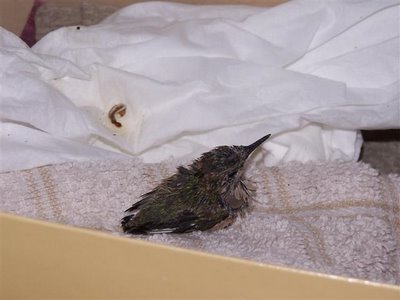 Ladies and gentlemen, get ready to have your maternal/paternal instincts tweaked. I got a call on July 16 from a parrot rescuer and sometime rehabilitator nearby. Some children had found a baby hummingbird floundering in a puddle in a park, and brought it to her. What and how to feed it; how to care for it? Oh, I wanted to take that bird, badly, but my summer travel schedule has precluded my caring for anything but what I've already got. My friend had a good idea already that sugar water wouldn't nourish a growing bird, so she'd ground up dry-roasted mealworms and added them, making a slurry that she administered with a dropper. Good going! But we could do better...
Ladies and gentlemen, get ready to have your maternal/paternal instincts tweaked. I got a call on July 16 from a parrot rescuer and sometime rehabilitator nearby. Some children had found a baby hummingbird floundering in a puddle in a park, and brought it to her. What and how to feed it; how to care for it? Oh, I wanted to take that bird, badly, but my summer travel schedule has precluded my caring for anything but what I've already got. My friend had a good idea already that sugar water wouldn't nourish a growing bird, so she'd ground up dry-roasted mealworms and added them, making a slurry that she administered with a dropper. Good going! But we could do better...A quick e-mail to Connie Sale, a Virginia hummingbird and songbird rehabilitator, established that the diet du jour for nestling hummingbirds is half Nekton Lori formula (a powdered formula, high in protein, that's for nectar-feeding lory parrots) and half Nekton Nektar-Plus, a hummingbird maintenance diet. Connie Fed-exed some packets of powder that were there the next day! I also recommended that S. dice up newly-molted mealworms or squeeze the innards out of them and administer that on the end of a blunt toothpick. Which she faithfully did.
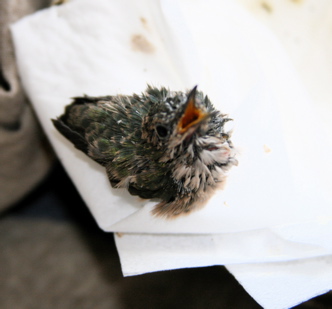 Hummingbirds aren't hard to feed when they gape! In a brief training session held in a parking lot in town, I taught S. how to wait until Magic got really hungry--he had a bad habit of lazily lapping nectar from the tip of the dropper. Nope. You'll be there all day hoping he gets enough. You have to make them open up wide, and then you can give them mealworm bits and a good squirt of protein solution deep into the crop, and it's all over in about a half-second. Nothing to it, except that you've got to do it every 30 minutes, dawn to dusk. That's the hard part...
Hummingbirds aren't hard to feed when they gape! In a brief training session held in a parking lot in town, I taught S. how to wait until Magic got really hungry--he had a bad habit of lazily lapping nectar from the tip of the dropper. Nope. You'll be there all day hoping he gets enough. You have to make them open up wide, and then you can give them mealworm bits and a good squirt of protein solution deep into the crop, and it's all over in about a half-second. Nothing to it, except that you've got to do it every 30 minutes, dawn to dusk. That's the hard part...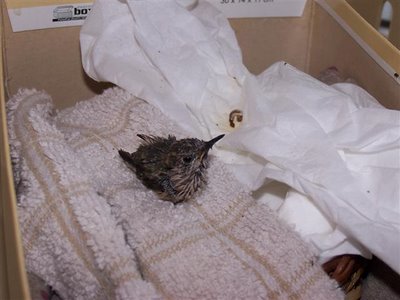 This is what you want to see in a hummingbird baby's morning poop. Lotsa solids. That means it's getting enough protein. Not trying to gross you out, but a big part of mothering something well is poop monitoring. I absolutely love how my friends with new babies talk about their business as if it's dinner table conversation, which it is when you're a new mom.
This is what you want to see in a hummingbird baby's morning poop. Lotsa solids. That means it's getting enough protein. Not trying to gross you out, but a big part of mothering something well is poop monitoring. I absolutely love how my friends with new babies talk about their business as if it's dinner table conversation, which it is when you're a new mom.Magic, as S. named the orphan, thrived from the get-go. He was about eight days old when she got him. He fledged on my birthday, and S. was ready with a screen tent in her backyard. We've been in close e-mail and phone contact. Yesterday, she emailed, worried that Magic wasn't really able to maneuver well enough to hover before his feeder. Today, she called, because not only could he hover and feed at the feeder and at any flower she offered, but he WANTS OUT!
At only 24 days, though, he's not nearly ready to be on his own, however jaunty and sassy he may act. 41 days is more on target. Even though the Birds of North America species account says that hummingbirds feed their fledglings from 4-7 days after first flight, I don't believe it for a minute.
My great hope is to erect my big fledging tent here and welcome Magic upon our return from our NEXT trip. At that point he'll be nearly ready to be independent, and he can have Eden at his doorstep when we zip the tent open. S. thinks that's a good idea, too, as she lives in a heavily settled area, full of cats, cars, wires and windows. Given hand-raised hummingbirds' predilection for landing on outstretched fingers, we think he's probably better off where that's an expected event. Here. With Mama Zick. Ooh, I can't wait. Cross your fingers for Magic and S., and for me, all but slobbering at the thought of having a hummingbird guest to care for.
Here's to S. for doing right by a tiny bird, for turning her life upside down to accommodate him, and here's to the overflowing kindness that makes such a thing possible, for a human being to mother a hummingbird.
Labels: orphaned hummingbird

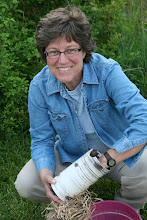

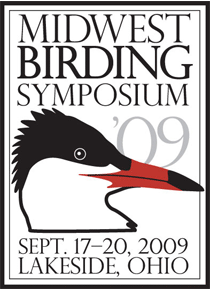
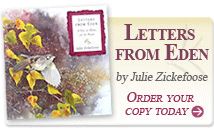

<< Home